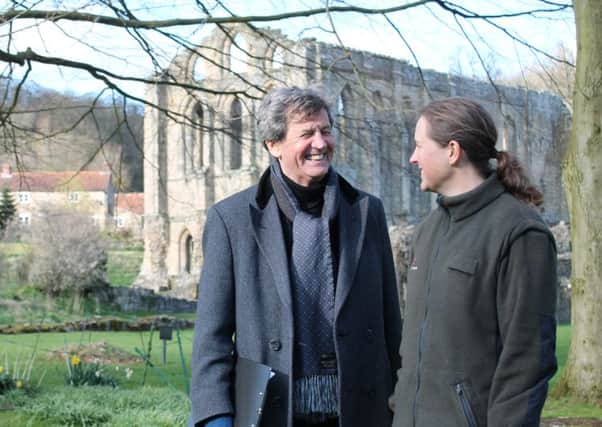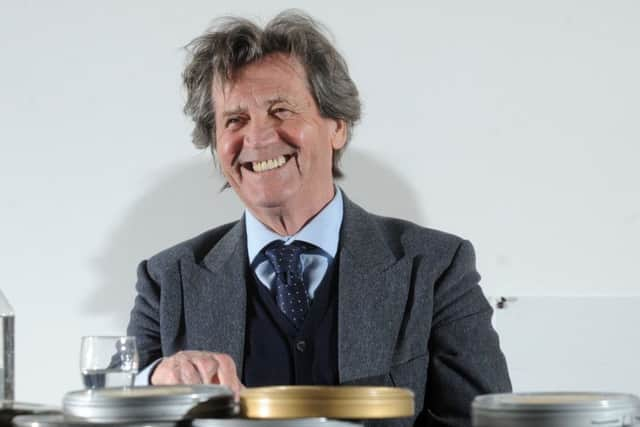Melvyn Bragg: The story of the North


WE hear a lot about the so-called Northern Powerhouse these days. But long before former Chancellor George Osborne coined the ubiquitous phrase its spirit existed in the steelworks of Sheffield, the docks at Hull and the factories and mills of Bradford and Leeds.
Over the centuries, the North of England has played a pivotal role in shaping not only this country but the rest of the world, too. But despite being the cradle of the Industrial Revolution, one of the most important periods in human history, its significance is often overlooked.
Advertisement
Hide AdAdvertisement
Hide AdIt’s something that Melvyn Bragg hopes to redress in a new 10-part series, starting today on BBC Radio 4. The Matter of the North charts the ebb and flow of the story of the North, starting from the 5th century when the Romans left our shores right up to the present day and Britain’s decision to leave the EU.


Lord Bragg travelled extensively across the region focusing on the pivotal historical moments and cultural contributions that have helped shape Britain’s place in the modern world.
He feels it’s a story that deserves greater recognition. “We hear a lot about the story of Scotland and of London, but what about the North? That’s got a story to tell and in my view it’s a better story than both of them,” he says.
“The North has not only been an important part it’s been a defining part of Great Britain. It’s here in the North that the original culture of England was founded after the Romans, the dissent and non-conformism bred great inventions, and that a particular sense of humour was developed.”
Advertisement
Hide AdAdvertisement
Hide AdYorkshire, he says, is at the heart of the North of England’s story. “It has long been a great power, it played a crucial part in the Industrial Revolution and its abbeys were the envy of Europe.”


Bragg, who was born in Carlisle, hopes the radio series will be a kind of hymn to the North. “I think it’s a wonderful part of the world and like most people who’ve been born and brought up here, I feel this is as much a country as any more neatly geographically defined place on the planet.”
In terms of its impact on the world, Bragg believes nothing surpasses the Industrial Revolution. “It makes the French Revolution look like nothing,” he says. “The Industrial Revolution led to new technology which led to Silicon Valley and it all started in the North of England. It’s impact on the world has been immense.”
The Northern heartlands, though, weren’t all about the wheels of industry. Bragg says the emergence of Romanticism, led by the Lake Poets including Wordsworth, Coleridge and Southey, had a profound effect on our thinking about nature. “The notion that nature was superior to reason was a fantastic new idea at the time that was developed by Wordsworth and his friends and attracted others like Turner.”
Advertisement
Hide AdAdvertisement
Hide AdIt was here, he says, where the radicalism that fed into the suffragette and anti-slavery movements was inculcated. In one of the programmes Bragg tells the story of rebellion and dissent. He visits Clifford’s Tower in York, the site of a Norman fortress built to keep the North under control. It was also the site centuries later, where Robert Aske – one of the leaders of The Pilgrimage of Grace (a great Catholic Rebellion) was executed. “There’s a strain of radicalism in the North that you can see with the Pilgrimage of Grace and later in the Jarrow March.”
As well as highlighting well known moments in history he also focuses on stories and places that some people may be less familiar with. On a visit to Rievaulx Abbey in North Yorkshire he finds evidence that the monks were on the brink of producing high quality cast iron and even blast furnaces. Bragg asks if the Reformation hadn’t happened whether the Industrial Revolution could have begun here hundreds of years earlier.
He also travels to Whitby – home of the great Abbey and its remarkable Abbess St Hilda – and discusses the power well-born women could wield in the early church with Katy Cubitt, Professor of Early Medieval History at York University. “Hilda of Whitby was one of the most powerful in civil life and she ran monasteries for men and women. This was radical at the time and it’s remarkable to think that she was banging the drum for women 1,200 years ago,” says Bragg.
The North also shaped our cultural lives, too. But not only through great writers and artists like the Brontës and David Hockney. “Culture is not just poetry and paintings. There’s the introduction of timetables which we’d never had before and better working hours. This led to the age range lengthening and medicines improving in our cities,” he says.
Advertisement
Hide AdAdvertisement
Hide AdFor its size, the North of England packs a big economic punch. “I’ve lived and worked in the North in places like Leeds, Liverpool and Newcastle and it’s a big area. Its economy is twice as big as Scotland’s and if it was a country it would be the eighth biggest in Europe.
“You have enormous contrasts between the cities with their industrial heritage and the countryside, this great, ice-gouged landscape. There’s a feeling of emptiness and wilderness that you don’t expect to find in this country.
“It’s been written about for centuries by people like Caedmon, the first English poet, right up to the present day with Simon Armitage.”
Bragg examines the northern dialect and how it is beginning to be marginalised and even mocked, but at the same time how it engenders a strong sense of identity in an increasingly transient world.
Advertisement
Hide AdAdvertisement
Hide AdWhile researching the series he spoke to a number of well known northerners including Dame Judi Dench, Sir Michael Parkinson and David Hockney about their thoughts. “There is something about coming from the North even if it’s not easy to define. When I spoke to Judi Dench and Geoffrey Boycott they said they feel northern,” he says.
Perhaps it stems from having to be self-reliant? “There’s a great inventiveness about the North that is important to Britain and Europe and it’s not happened by accident. There’s something there that makes it happen. People in the North will say ‘give us the tools and we’ll start getting the job done.’”
This willingness to adapt along with an inherent creativity continues to shape our world. “The North is still one of the most significant influences on civilisation on the planet. The development of an industrial and technological society has completely changed the way people work and live their lives. We’ve seen the move from a rural to an urban way of life over the past 300 years and the North has been a big player, and I’d say the key player, in all this.”
The Matter of the North is broadcast on BBC Radio 4 at 9am (weekdays) from today until September 9.
History of the North - key dates
Advertisement
Hide AdAdvertisement
Hide Ad122- 128 AD - Hadrian’s Wall is built stretching from coast to coast.
793 - The Vikings raid England’s North East coast for the first time.
1069 - The ‘harrying of the North’ takes place. Following this rebellion the area north of the River Humber is left devastated.
1536 - A Northern uprising, known as The Pilgrimage of Grace, takes place.
Advertisement
Hide AdAdvertisement
Hide Ad1780 - The Industrial Revolution begins to transform Britain.
1825 - The The Stockton and Darlington railway - world’s first public passenger railway - opens.
1903 - The Women’s Social and Political Union - nicknamed the suffragettes - holds its inaugural meeting.
1936 - The Jarrow March takes place.